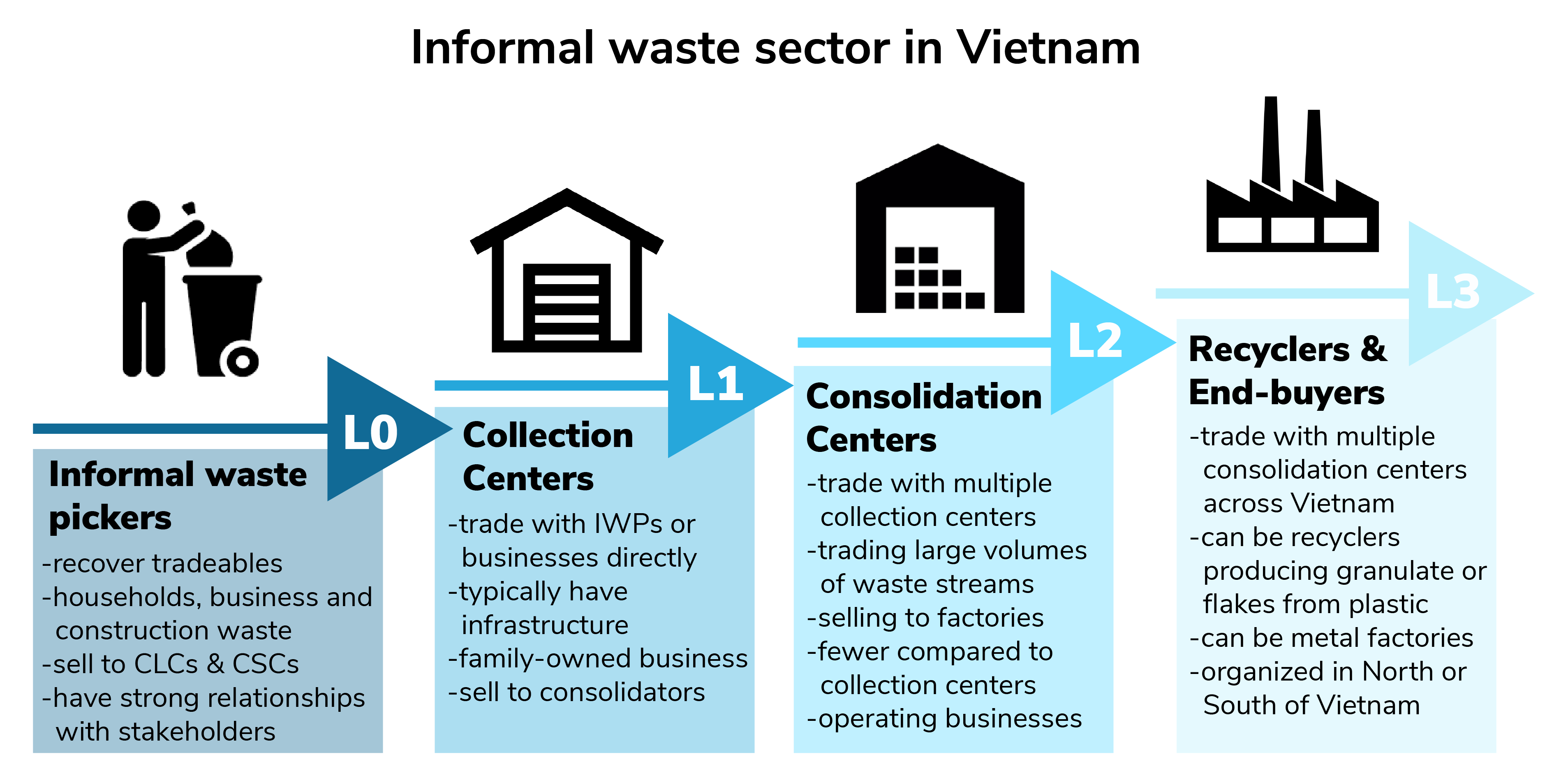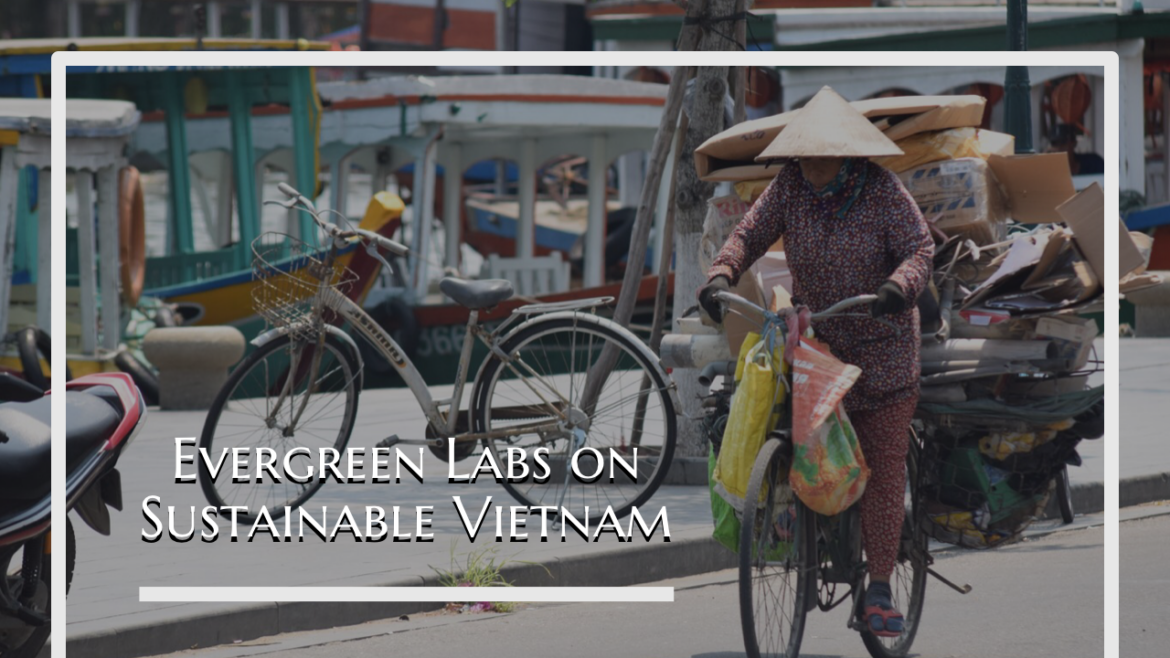By Dr. Kasia Weina, Director & Founding Partner, Evergreen Labs –
Spotlight our extensive work in the plastic sector, highlighting our innovative approach and stories from ground including waste workers and partners
Recently, there has been an overarching trending theme around zero waste and plastic waste elimination. However, there still remains a lot of ignorance surrounding these topics including understanding where your waste goes, what does recycling truly mean and how one can reduce their environmental footprint sustainability. Over the course of this month, I hope to shed some light on these topics through grass-roots expertise developed at Evergreen Labs with complimentary case studies to highlight action on the ground with real life solutions in Vietnam.
Not All Plastic is Equal
To start the zero-waste discussion, one must understand first that not all plastic is equally problematic. While at first glance this may not make sense in the plastic waste processing industry it’s all about type, quality and recovery. There are two main categories of plastics: “high-value” or “tradables” and “low/no-value” or “orphan” plastics.
The first type of plastics consists of PET (water bottles) and all hard plastics such as HDPE (laundry detergent containers). These materials are currently being collected by the informal waste sector (described in more details below) and traded up through the value chain where it ultimately gets recycled. However, don’t be fooled, PET cannot be endlessly recycled and typically ends up downcycled into polyester fibers for the textile industry.
The second plastic type is the no-value material that does not currently get collected as there is no infrastructure, processing or technology in place to reuse this material. These types of plastics include wrappers, packaging, food containers, single-use plastics, plastic bags, multilayers, sachets, etc. Currently, there is no recycling occurring for any of these materials and as these materials tend to be light they can be easily blown into waterways and surrounding environments.
Vietnam’s Waste Composition & Collection
When taking a deeper look into Vietnam’s waste composition, nearly 70% of the waste is organic or wet waste. This is due to the high consumption of fresh produce by the country. While 12% are plastics and of this only 15% are currently being recycled leaving 85% of plastics being disposed of in landfills or surrounding environments. While there are more studies being completed to fully understand the volume of waste being produced by Vietnam, none of them are fully conclusive and the data varies greatly between studies. It is estimated that Vietnam produces over ~30 million tons of waste/year and ~3,500 tons of plastic waste per day is discharged (World Bank, 2018).
As mentioned briefly, the workhorse of recycling in Vietnam and similar in neighboring Southeast Asian countries is the informal waste sector or người ve chai in Vietnamese. These workers, typically women, are scavenging through waste to collect all valuables including plastics from household and business waste. They bring their collected loads to aggregators and it gets traded up the value chain until arriving at processors (see figure). Currently, there is no other mechanism in Vietnam for extraction of value material and therefore all recycling in the country is only possible thanks to these workers. For more information on the informal sector you can refer to our research with UNDP and feature in South China Morning Post.

Diagram provided by Evergreen Labs.
Viable Solutions
Currently, the informal sector is not addressing the no-value plastic as they have no buyer for such material. Therefore there has been a recent push towards the development of innovation that tackles this issue. Without sustainable, commercially viable solutions this type of waste will overfill or landfills and cover our environment and oceans. To highlight solutions working towards solving this problem in Vietnam, we zoom into Central Vietnam where the Evergreen Labs team developed a social venture that aims to give no-value plastic waste value.
In 2017, Evergreen Labs began its work in low-value plastics and the research phase of the project began (refer to EGL approach article). After nearly 4 years of R&D, feasibility, machine development and piloting, ReForm Plastic became a fully operational social enterprise. ReForm Plastic is a cost-effective, innovative approach to tackling the most difficult waste in an inclusive model. Through simple, low-cost processing they are able to convert the unusable waste into a tradeable, commodity board product. These boards can be used as wood replacements for furniture, particularly with superior outdoor properties (including desks, planter boxes, lockers, chairs, more in the product catalog here). The current facility processes about 40 tons of waste per month that would normally stay in the landfill or end up in the environment. After opening their first facility in 2020, the team is looking to expand this model via a social franchising approach and has already opened 2 social franchises with partners in Myanmar.
Giving Plastics Value
By giving all plastics value, we can remove them from the environment and create a circular system of endless product life cycles. While the best solutions include the elimination of plastics all together, we are still consuming unfathomable amounts globally and solutions are desperately needed to utilize this material.
Next article will examine upstream efforts to become zero-waste and remove plastic consumption altogether.
(Vietnamese Version)
All views and opinions expressed on this site are those of the individual authors and comments on this site are the sole responsibility of the individual contributor.

